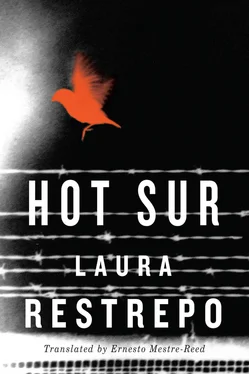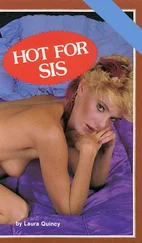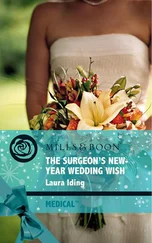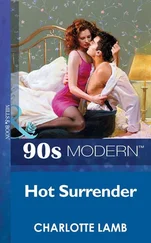The cure for the reckoning is work. Nonstop work, in handicraft, in whatever you can get, leather embossing, crocheting, knitting, making wooden objects, whatever, so you can rock to the whir of the routine of your hands and let them think for you, so that there is no other thought in you besides that trivial thought free of anguish that the hands think. It’s the best antidote. But it’s hard to get work in the prison. It they don’t trust you, you can’t have access to tools that can be turned into weapons, you know, so they only give them to you, if they give them to you at all, for a couple of hours and under surveillance. Only a small percentage of prisoners enjoys the privilege of manual labor, and most of them are white, because the black and Latino prisoners are always under suspicion. They let me make knapsacks from polyester fiber, tying the yarn by hand. That soothes my mind, and it is easy to get permission for because no tools are necessary. Making knots hour after hour is a compulsion that may save you if the reckoning has befallen you; at least it works for me, and I have become almost addicted to it, I could tie polyester yarn from here to eternity, thinking about nothing. The other recourse against the reckoning is to sign up to mop floors. They always need volunteers because never in my life have I seen such shiny floors. At all hours, there’s someone mopping the concrete, somebody cleaning what cannot be cleaned. No matter how much bleach they use the smell still lingers there, floating in the darkness, the stink of the urine and sweat and shit of the thousands of prisoners that for more than a century have inhabited this place, the miasma of the great sewer that runs under these floors that each day they mop and mop until they’re dazzling.
I at least remained in high spirits with the polyester knapsacks and the mopping, but the hemorrhaging has dwindled my strength and each day brings me down even further. There I go off on a tangent again. I begin to tell you something, but I’m dragged by a gust that blows and end up who knows where. I was asking you, Mr. Rose, how you would describe me physically in the novel, because in class it didn’t seem that you looked at us or were interested in me or any of the others, not in that way; you didn’t even seem to flinch when we sat in the front row and crossed our legs provocatively. We were about to give you up as a homosexual when you spoke to us about a girlfriend who was a teacher of deaf children. After you left, we gossiped about such a little saintly pair, her dealing with the deaf and you with prisoners. I think you never properly inspected us visually, undressed us with your eyes, as they say, out of good manners, and perhaps because you knew how persnickety the gringos are about harassment. So I’ll have to tell you what I look like myself, describe what I look like, in case you don’t remember.
I’m sorry if this seems conceited, but I consider myself a rather pretty woman. Not beautiful or gorgeous, but definitely pretty. My hair is coffee-colored, long and thick. A thick head of hair, a crown of hair I should say. My hair is my best feature. The only thing that hasn’t deteriorated with the hemorrhaging and with this life in jail. As for the rest, I have acceptable features, a seductive smile although not perfect because I never wore braces, tanned skin, cinnamon they call it, and a pleasing little body. That’s what a boyfriend told me once the first time he saw me naked; he told me that I had a pleasing little body. I found the comment a little off-putting, especially in the middle of what was supposed to be a torrid sex scene. But maybe the man didn’t want to offend and was only making “an objective description with restrictive use of adjectives” as you would have advised in your creative-writing class. Anyways, I’m no babe, but I’m also not lacking in female graces. Well, I have a pleasing body when I’m thin, although not as thin as now, now I’m thin as a rake, and besides I’ll confess that for a long time I was fat, chubby fat with a big ass, especially after I got married, married life accumulated in my thighs and in my butt. Now I’m very skinny, and that makes me look anorexic, with the prominent cheekbones and the eyes grown so large I look like a nocturnal bug. Because of the anemia, my hands are transparent. If I put them against the light I imagine I can see the bones, like in an X-ray. And although my current appearance shocks me, I think Kate Moss would be envious.
One time, after I had arrived in America, I had to fill out an application for a job. I was with my friend Jessica Ojeda, who was born in New Jersey and spoke English better than I did. Although just because she was born here was no guarantee she spoke better English. I learned it as a girl in Colombia, at the Colegio Bilingue Corazon de María of the Mothers Clarisas, which I attended with the Navas and in which Mother Milagros provided intensive lessons on grammar, pronunciation, and English literature five days a week. Then I got to America and from the time I was twelve to the time I was eighteen I hung out in Latino neighborhoods in which English was hardly heard. My first great disappointment upon arriving in America was that Bolivia had no car, the second that it was so hot, and the third was that in America everyone spoke only Spanish. You want to know what the business signs were of my first neighborhood in America? La Lechonería, Pasteles Nelly, Rincón Musical, Pollos a la Brasa, Tejidos el Porvernir, Pandi y Panda Ropa a Mano para Bebe, Papasito Restaurante, Cuchifrito, Sabor de Patria, Fútbol en Directo, Cigarrillos Pielroja, Consultorio Pediatrico para Niños y Niñas. And so on. But back to the job application that I filled out with Jessica Ojeda. She noticed that where they asked for the color of your eyes and hair, I wrote coffee . Hair color: coffee . Eyes: coffee . Skin: coffee with milk . That’s what I wrote because that’s what we call that color, coffee — or rather it is one of three terms: wheat, cinnamon, or coffee.
“Those are names of food,” Jessica reprimanded me. “Don’t say that here, because people get offended. Here you say Latino when they ask you for your ethnic group and dark brown when they ask you about your hair and eyes.”
“You don’t understand,” I explained. “Those of us born in the coffee zone have coffee eyes, and hair that is the same color as brilliant dark coffee in a cup, of coffee when it is magnificently coffee-colored. And our skin is the color of coffee with milk and sugar when you drink it really hot.”
“Alright then,” she said, offering a compromise, “put dark brown.”
“Not dark brown.” I held my ground. “Coffee. I’m proud of that, end of story.”
Let’s see, Mr. Rose, what else can I tell you about me? Do you want to know if I have any special features? A few scars, which here in prison they call embroidery. One on my cheek from a scratch from Violeta that I told you about. Another one from an appendix operation, one on the eyebrow from a bicycle fall, a mole an inch from the corner of my mouth on the right side. Normal all in all, so far, but I have a few other things that are somewhat embarrassing. For example, stretch marks on my thighs from all the weight I gained and lost, too much hair on my legs, and a coffee-colored bramble of pubic hair; one of my nostrils is a bit higher than the other, and although I’d like to tell you that my breasts are full, like in the novels, the truth is I barely fill an A cup. Aside from that, I’m five feet five inches tall, wear size seven and a half shoes, have transparent hands from anemia, which I told you already, and have a pair of ears that are “full,” but which I can fortunately hide under my long hair.
I’d like it if in your book you recounted Bolivia’s departure for America as sad but also joyful, because before she left we took a hot shower together, something we had never done. She washed my hair with an herb shampoo that she herself made in the kitchen, and since my body was small and dark, hers seemed a wonder, so round and full, so white and generous, which always made me uneasy. I was a little girl, Mr. Rose, and didn’t know much about life. But I did know one thing, that my mother did things with her body. Though I wouldn’t be able to tell you exactly what. I felt as if her body wasn’t guarded, wasn’t private, but rather exhibited outside the house; there was something about Bolivia’s body that fascinated me and frightened me at the same time. That afternoon she had ironed my halter top and favorite dress, a yellow jumper, my favorite color then. Bolivia knew how to iron with starch beautifully, by which I mean that the clothes came out fragrant and fresh, as if new. It seems it was a family thing, because her mother also ironed, my poor wretched grandmother Africa María, may she rest in peace. And my mother had shown me; I think it was one of the few things she got to show me before she left. Although come to think of it, I must have made that up. No one shows a seven-year-old girl how to iron; that would be an atrocity. A girl would burn herself with an iron. Anyway, I’d have liked for such a memory to be real, and maybe it is and it is good to think that Bolivia taught me something, that she left me something before leaving for America, something besides the coscoja , the broken-off coin piece that hangs from the chain around my neck, well, that used to hang around my neck before they confiscated it when I was brought to Manninpox.
Читать дальше












